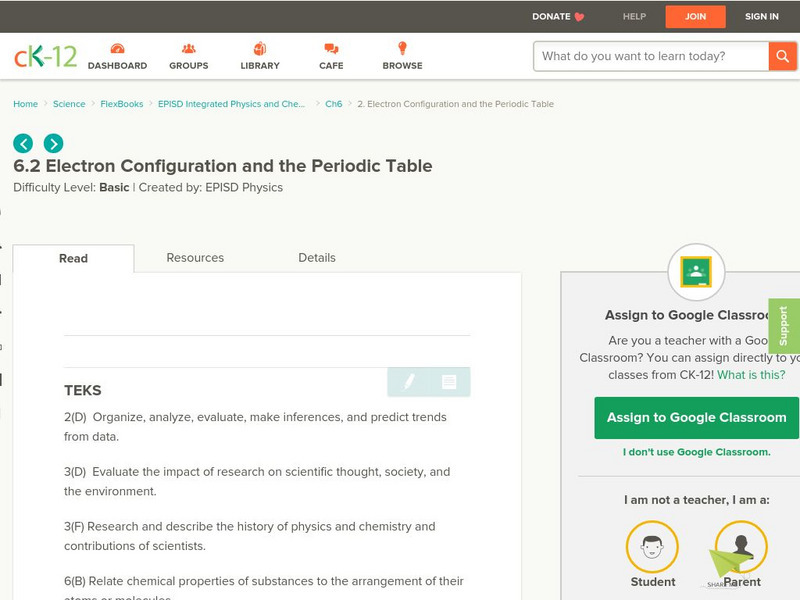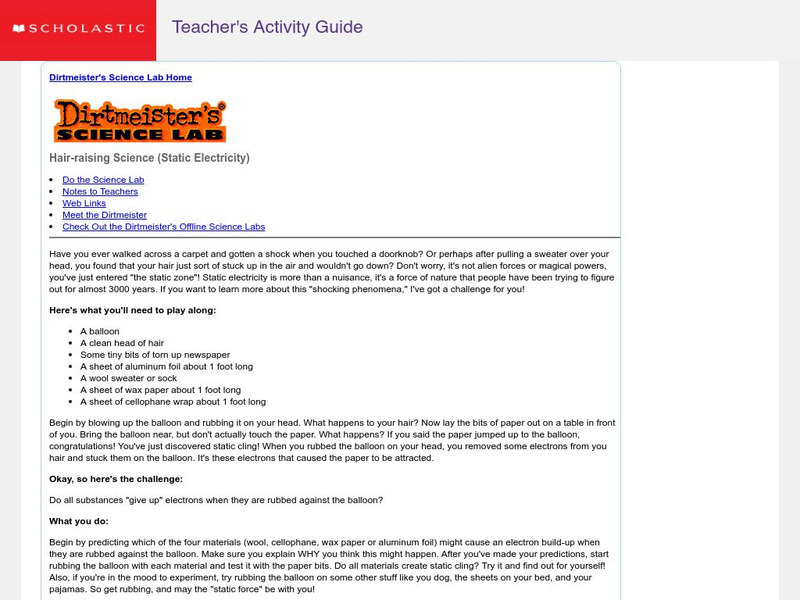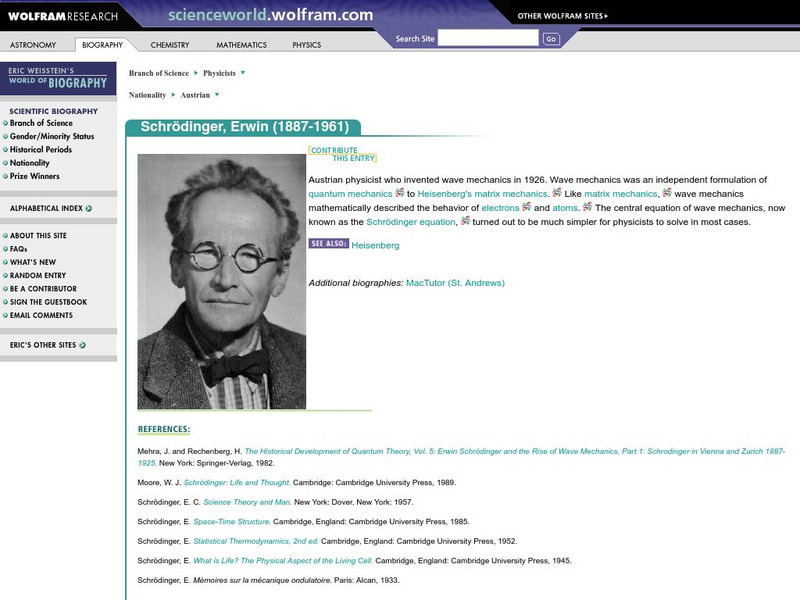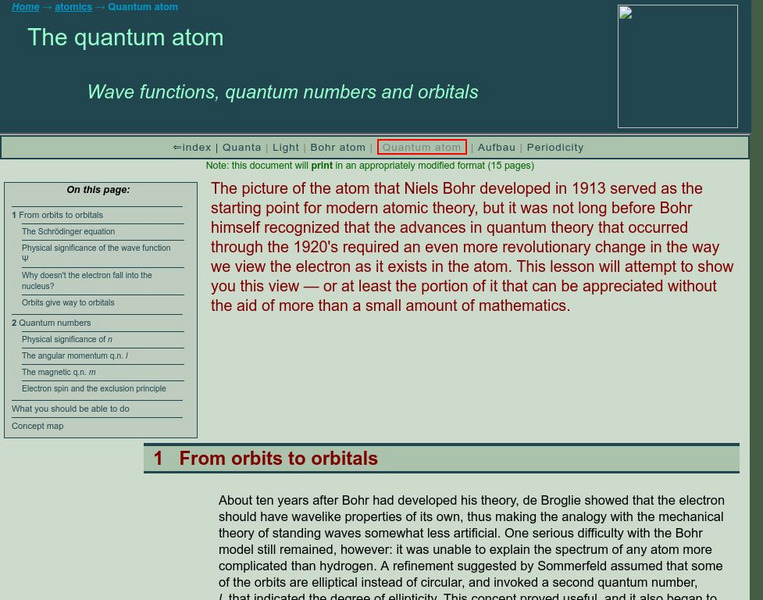CK-12 Foundation
Ck 12: Electron Configuration and the Periodic Table
[Free Registration/Login may be required to access all resource tools.] In this learning module, students will explore how the form of the periodic table is related to electron configurations, which in turn influences chemical reactivity.
PBS
Pbs Learning Media: The Atom
In this interactive activity from ChemThink, students will take a closer look at atomic structure, properties, and behaviors. Includes background reading material and discussion questions.
Utah Education Network
Uen: Atom in a Bag
Students will use bags of beads with known quantities of electrons, neutrons and protons to identify the element that they represent.
Discovery Education
Discovery Education: 3 M Young Scientist Lab: Charged Fingers
Do you have the magic touch? Watch as your finger mysteriously moves a pencil without touching it.
PBS
Pbs Learning Media: Atomic Structure
Take a look at the parts of an atom and learn about its properties.
Georgia State University
Georgia State University: Hyper Physics: Hund's Rules
An excellent overview of Hund's Rules. Discusses all three rules thoroughly with provided diagrams.
Concord Consortium
Concord Consortium: Molecular Workbench Showcase:scanning Tunneling Microscopy
A learning module that investigates a powerful tool to observe and manipulate atoms called the scanning tunneling microscope.
Scholastic
Scholastic: Dirtmeister's Science Lab: Hair Raising Science
A great experiment to show students how electrons move by static electricity. This site includes web links, a challenge question, and notes for the teacher.
Wolfram Research
Wolfram Science World: Erwin Schrodinger
ScienceWorld.com offers a brief biography and image of Austrian physicist and inventor of wave mechanics, Erwin Schrodinger.
Texas Instruments
Texas Instruments: Electron Charge Lab
In this activity students experimentally determine the magnitude of the elementary charge on an electron.
Texas Instruments
Texas Instruments: Electron Vocabulary
This StudyCards stack enables students to review the vocabulary used in studying electron behavior.
University of Colorado
University of Colorado: Physics 2000: Energy Levels
This site describes the energy levels of atoms.
Science Education Resource Center at Carleton College
Serc: Properties of Electrostatic Charge: Interactive Lecture Demonstration
Students will investigate the properties of charge, charge by contact, the polarization of charge, and charge by induction. Through the use of demonstrations, students should have a thorough understanding of the movements of electrons...
Simon Fraser University
Chem1 Virtual Textbook: The Quantum Atom
Acting as a subtopic of the General Chemistry Virtual Textbook's section on Atoms and the Periodic Table, this site specifically addresses the quantum atom and related topics. The related topics include the wave function and its physical...
Simon Fraser University
Chem1 Virtual Textbook: The Quantum Numbers
Acting as a subtopic of the General Chemistry Virtual Textbook's section on Atoms and the Periodic Table, this site discusses quantum numbers of electrons in atoms including topics such as principal quantum number and orbitals of the...
Simon Fraser University
Chem1 Virtual Textbook: Electron Electron Repulsion
Acting as a subtopic of the General Chemistry Virtual Textbook's section on Atoms and the Periodic Table, this site discusses repulsion of electron pairs. Diagrams and charts of the repulsion are also provided.
Other
University of Winnipeg: The Pauli Exclusion Principle
This site provides information concerning the idea behind the Pauli Exclusion Principle. Includes basic terminology and explanations for understanding.
Museum of Science
The Atoms Family: Spectroscope of an Atom
"The Phantom has provided you with a simulated spectroscopy of an Atom! Amuse the Phantom by observing the spectroscope and you'll learn more about the Atom." Observe and review the structure of the atom.
Wikimedia
Wikipedia: Photoelectric Effect
Wikipedia provides excellent information on the photoelectric effect, including it's history, explanations, common uses, and more.
Crescent Public Schools
The Internet Science Room: Quantum Numbers
Using diagrams, illustrated examples, and student practice this chemistry class tutorial explains quantum numbers.
Michael Blaber, PhD
Fsu: Basic Concepts of Chemical Bonding: Exceptions to the Octet Rule
Lists the exceptions to the octet rule and provides a discussion and diagrams explaining each one. Includes clear diagrams illustrating this concept.
Dartmouth College
Dartmouth College: Chem Lab: Welcome to General Chemistry Laboratory!
Geared towards helping Dartmouth College students starting General Chemistry Laboratory, this site offers resources important for anyone in the lab. Learn why you should keep a lab notebook and how to keep yourself and others safe. This...
Open Curriculum
Open Curriculum: Electron Configurations
This Kahn Academy video will help students understand why electrons align in atoms the way they do.
Thomas Jefferson National Accelerator Facility
Jefferson Lab: It's Elemental: Element Math Game
The interactive activity examines the Periodic Table of Elements. Learners answer questions about the number of protons, electrons, neutrons, or nucleons that an atom of an element contains.















